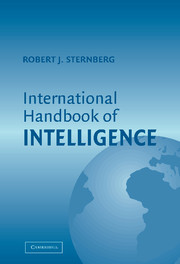Book contents
- Frontmatter
- Contents
- List of Contributors
- Preface
- 1 Intelligence Research and Assessment in the United Kingdom
- 2 Intelligence – Theory, Research, and Testing in the Nordic Countries
- 3 The Psychology of Human Intelligence in Spain
- 4 Psychology of Human Intelligence in France and French-Speaking Switzerland
- 5 Research on Intelligence in German-Speaking Countries
- 6 Is It Possible to Study Intelligence Without Using the Concept of Intelligence? An Example from Soviet/Russian Psychology
- 7 Intelligence Theory, Assessment, and Research: The Israeli Experience
- 8 Intelligence and Intelligence Testing in Turkey
- 9 Intelligence: What Is Indigenous to India and What Is Shared?
- 10 Japanese Conception of and Research on Human Intelligence
- 11 Diligence Makes People Smart: Chinese Perspectives of Intelligence
- 12 Similar Thoughts under Different Stars: Conceptions of Intelligence in Australia
- 13 Being Intelligent with Zimbabweans: A Historical and Contemporary View
- 14 Intelligence Research in Latin America
- 15 North American Approaches to Intelligence
- 16 Human Intelligence: From Local Models to Universal Theory
- Index
- References
13 - Being Intelligent with Zimbabweans: A Historical and Contemporary View
Published online by Cambridge University Press: 05 June 2012
- Frontmatter
- Contents
- List of Contributors
- Preface
- 1 Intelligence Research and Assessment in the United Kingdom
- 2 Intelligence – Theory, Research, and Testing in the Nordic Countries
- 3 The Psychology of Human Intelligence in Spain
- 4 Psychology of Human Intelligence in France and French-Speaking Switzerland
- 5 Research on Intelligence in German-Speaking Countries
- 6 Is It Possible to Study Intelligence Without Using the Concept of Intelligence? An Example from Soviet/Russian Psychology
- 7 Intelligence Theory, Assessment, and Research: The Israeli Experience
- 8 Intelligence and Intelligence Testing in Turkey
- 9 Intelligence: What Is Indigenous to India and What Is Shared?
- 10 Japanese Conception of and Research on Human Intelligence
- 11 Diligence Makes People Smart: Chinese Perspectives of Intelligence
- 12 Similar Thoughts under Different Stars: Conceptions of Intelligence in Australia
- 13 Being Intelligent with Zimbabweans: A Historical and Contemporary View
- 14 Intelligence Research in Latin America
- 15 North American Approaches to Intelligence
- 16 Human Intelligence: From Local Models to Universal Theory
- Index
- References
Summary
Conceptions of intelligence and associated practices vary widely across societies and are influenced by the unique socio-cultural histories of those societies. For example, differences in perspectives on intelligence between nations or communities have been linked to differences in (1) cultural beliefs about human abilities (Cole,1998; Serpell & Boykin, 1994, 2000), (2) availability and accessibility of formal education to the general public (Oslon, 1984), (3) the social and economic goals that people in different nations or communities seek to achieve (Serpell & Boykin, 1994; Vernon, 1969; Whyte, 1998;), (4) level of industrialization (or development) of nations or communities and the values underpinning the achieved or aspired developmental statuses (Azuma, 1984; Serpell, 2000; Vernon, 1969), and (5) the availability of human and material resources for the study of intelligence (Mpofu & Nyanungo, 1998). These differences in socio-cultural contexts are important for an understanding of the psychology of human intelligence across nations. For example, developed countries with their more complex socio-technical systems may place a higher premium or value on technical and bureaucratic efficiency than do developing countries, which tend to have simpler socio-technical systems (Serpell, 2000).
This chapter presents an overview of perspectives and research on intelligence in modern Zimbabwe as well as related practices. To begin with, I present a brief outline on the historical and demographic context of Zimbabwe as background to subsequent discussion. The historical and demographic summary is followed by a discussion of definitions and theories of intelligence in Zimbabwe.
- Type
- Chapter
- Information
- International Handbook of Intelligence , pp. 364 - 390Publisher: Cambridge University PressPrint publication year: 2004
References
- 8
- Cited by



